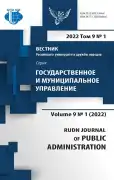Human Resource Management in Entrepreneurial Business: A Literature Review
- Авторлар: Omotoye O.O.1, Abdulazeez A.O.2, Olusesi L.D.1
-
Мекемелер:
- University of Lagos (UNILAG)
- Osun State University
- Шығарылым: Том 9, № 1 (2022)
- Беттер: 73-82
- Бөлім: Public administration: theory and practice
- URL: https://journal-vniispk.ru/2312-8313/article/view/318040
- DOI: https://doi.org/10.22363/2312-8313-2022-9-1-73-82
- ID: 318040
Дәйексөз келтіру
Толық мәтін
Аннотация
Entrepreneurial orientation is critical for small and medium organizations for the survival and growth of their businesses. Entrepreneurial is an undertaking in which a particular human being proceeds along with opportunities by exploring the benefit of human resource management. The study justified that the role of managing human resources effectively and efficiently is significant in fostering and maintaining high levels of productivity in entrepreneurial businesses. Employees are said to be the most important resources available to an entrepreneur in the creation, development, and sustenance of a thriving entrepreneurial business. However, it was recommended that business owners should ensure competent candidates are being selected and placed during the recruitment process, as proper selection and placement of candidates into the organization will result into having the right people doing the right job which would enhance future performances of entrepreneurial businesses.
Негізгі сөздер
Авторлар туралы
Oluwatobi Omotoye
University of Lagos (UNILAG)
Хат алмасуға жауапты Автор.
Email: omotoyetobio95@gmail.com
ORCID iD: 0000-0001-6556-8690
MSc Student of the Department of Employment Relations and Human Resource Management
101245, Lagos, NigeriaAbdulmaleek Abdulazeez
Osun State University
Email: abdulmaleek.abdulazeez@unisoun.edu.ng
MSc Student of the Department of Human Resource Development
210001, Osogbo, NigeriaLateef Olusesi
University of Lagos (UNILAG)
Email: olusesidamilare2016@yahoo.com
MSc Student of the Department of Employment Relations and Human Resource Management
101245, Lagos, NigeriaӘдебиет тізімі
- Emil K., Senad B., Ognjen R. Strategic Human Resource Management in Small and Medium Enterprises. International Journal of Human Resource Development and Management. 2020;20(2):114-139.
- Ihua U.B. SMEs Key Failure-factors: A Comparison between the United Kingdom and Nigeria. Journal of Social Sciences. 2009;18(3):199-207.
- Teece D.J. Explicating Dynamic Capabilities: The Nature and Micro Foundations of (Sustainable) Enterprise Performance. Strategic Management Journal. 2007;28(13):1319-1350.
- Okoe A.F., Boateng H., Narteh B., Boakye R.O. Examining Human Resource Practice Outcomes and Service Innovation. The Service Industries Journal. 2018;38(7-8):431-445.
- Orakwue A., Iguisi O. Conceptualizing Entrepreneurship in Human Resource Management. International Journal of Research in Business and Social Science. 2020;9(3):85-93.
- Naylor J.C., Pritchard R.D., Ilgen D.R. A Theory of Behavior in Organizations. New York: Academic Press; 1980.
- Schuler R.S., Jackson S.E. Linking Competitive Strategies with Human Resource Management Practices. Academy of Management Executive. 1987;1(1):207-219.
- Porter M.E. Competitive Advantage. New York: Free Press; 1985.
- Rogers E.M. Diffusion of Innovations. New York: Free Press; 1983.
- Pfeffer J., Salancik G.R. The External Control of Organizations: A Resource Dependence Perspective. NY: Harper and Row; 1978.
- Bird R., Hall A., Momente F., Reggiani F. What Corporate Responsibility Activists Are Valued in the Market? Journal of Business Ethics. 2007;76(1):189-206.
- Barney J.B. Firm Resources and Sustained Competitive Advantage. Journal of Management. 1991;17(1):99-120.
- Dabic M., Ortiz-De-Urbina C.M., Romero-Martinez A. Human Resource Management in Entrepreneurial Firms: A Literature Review. International Journal of Manpower. 2011;32(1):14-33.
- Putari V. Evolution of Entrepreneurship. URL: http://www.managementparadise.com/forums/entrepreneurship/1118-. Accessed: 26.07.2021.
- Ikeme A.I., Onu V.C. Creativity, Innovation and Entrepreneurship: Implication for Youths and Government. A Paper Presented at the Annual Conference of the Psychological Association, Nigeria: University of Nsukka; 2007.
- Ilesanmi O.A. Entrepreneurial Development. 2012:2-7.
- Jones G.R., George J.M., Hill C.W.L. Contemporary Management. New York: McGraw-Hill; 2000.
- Dessler G. Human Resource Management. New Delhi: Prentice hall; 2008.
- Lin C.H., Peng C.H., Kao D. The Innovativeness Effect of Market Orientation and Learning Orientation on Business Performance. International Journal of Manpower. 2008;29(8):752-772.
- Singh N.R., Kassa B. The Impact of Human Resource Management Practice on Organizational Performance: A Study on Debre Brehan University. International Journal of Recent Advances in Organizational Behaviour and Decision Sciences. 2016;1(1):643-662.
- Ezeali B.O., Esiagu N.L. Public Personnel Management. Onitsha: Book Point ltd; 2010.
- Adagbabiri M.M., Okolie U.C. Human Resource Management Practices and Organizational Performance: An Empirical Study of Oil and Gas Industry in Nigeria. RUDN Journal of Public Administration. (2020);7(1):53-69. https://doi.org/10.22363/2312-8313-2020-7-1-53-69
- Verma A. Impact of Compensation and Reward System on Organization Performance: An Empirical Study. International Journal of Research and Analytical Reviews. 2018;5(4):136-140.
- Ndung’u A.W., Kwasira J. Role of Reward Systems in Enhancing Employee Motivation in Commercial Banks in Nakuru Town, Kenya. International Journal of Economics, Commerce and Management. 2016;4(10):797-820.
- Nabi M.N., Ahmed A.A. T., Rahman M.S. The Empirical Study on Human Resource Management Practices with Special Reference to Job Satisfaction and Employee Turnover at Investment Corporation of Bangladesh. Human Resource Management Research. 2017;7(1):54-64.
- Noe R.A., Hollenbeck J.R., Gerhart B., Wright P.M. Human Resource Management: Gaining a Competitive Advantage. USA: McGraw-Hill; 2004.
- Huselid M.A. The Impact of Human Resource Management Practices on Turnover, Productivity, and Corporate Financial Performance. The Academy of Management Journal. 1995;38(3):635-672.
- Thang N.N., Buyens D. What We Know About Relationship between Training and Firm Performance: A Review of Literature. Vlerick Leuven Gent Working Paper Series. 2009;1:1-34.
- Katz J., Aldrich H.E., Welbourne T.M., Williammas P.M. Special Issue on Human Resource Management and the SME: Toward a New Synthesis. Entrepreneurship: Theory and Practice. 2000;25(1):7-10.
- Madmoli Z. Investigating the Relation Between Human Resource Management and Organizational Entrepreneurship: The Mediating Role of Knowledge Sharing by Middle Managers (Case Study: Ahwaz Pipe Manufacturing Company). 2016. URL: http://www.ijhcs.com/index.php/ijhcs/index. Accessed: 26.05.2020.
- Uyar A.S., Deniz N. The Perceptions of Entrepreneurs on the Strategic Role of Human Resource Management. Procedia - Social and Behavioral Sciences. 2012;58(2):914- 923.
- Sun L., Samuel A., Kenneth S. High-performance Human Resource Practices, Citizenship Behavior, and Organizational Performance: A Relational Perspective. Academy of Management Journal. 2007;50(3):558-577.
- Narula N., Chaudhary N. Human Resource Management as Entrepreneurial Tool: A Literature Review. Amity Journal of Entrepreneurship. 2018;3(1):66-72.
- Amaka O., Osarumwense. Conceptualizing Entrepreneurship in Human Resource Management. International Journal of Research in Business & Social Science. 2020;9(3):85-93.
- Obasan K.A. Impact of Human Resources Management on Entrepreneurship Development. Economica. 2014;10(1);83-93.
Қосымша файлдар










